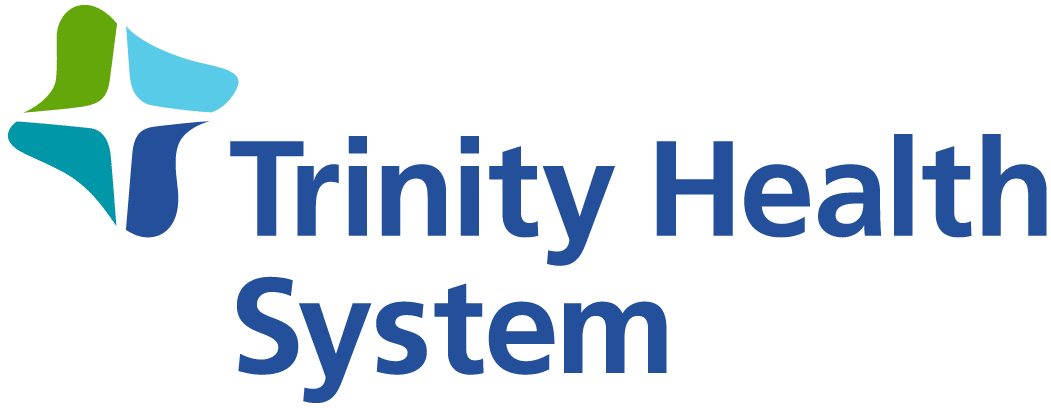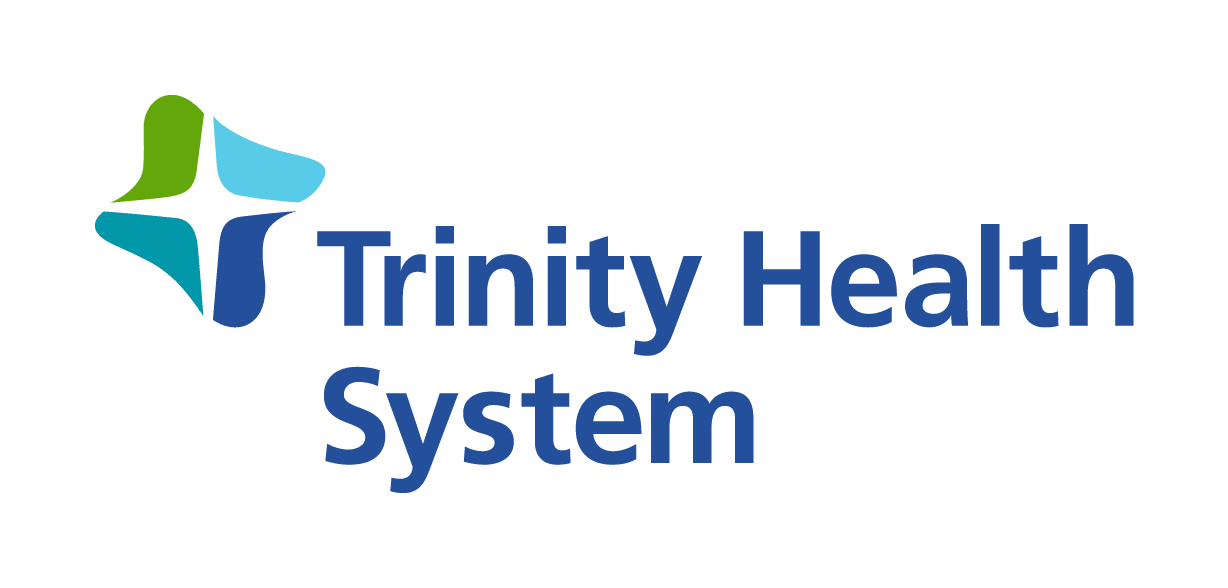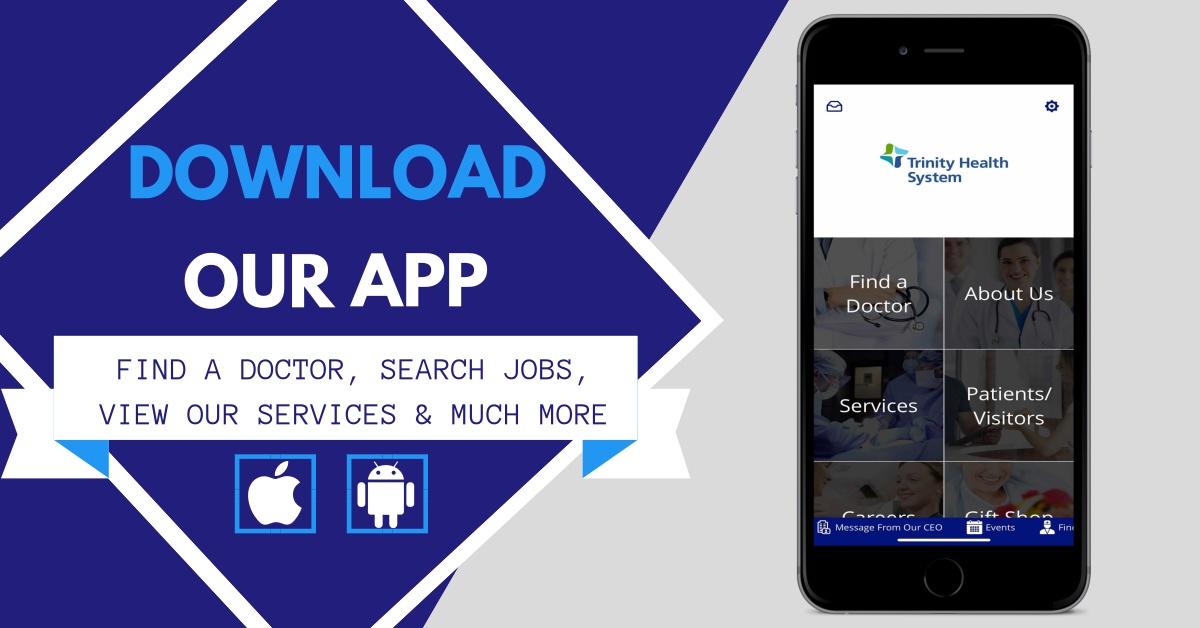Trinity Health System Department of Laboratories currently provides full anatomical and clinical pathology services to hospital in-patients and out-patients of all ages on a 24-hour basis, seven days per week. The Laboratory Department performs necessary biological and chemical test procedures that aid the ordering physician in diagnosis, prognosis, monitoring treatment, and maintenance of his/her patients. All patients are required to have a written physician order for services requested. Click Here for our laboratory test menu.
Locations & Times
Twin City Medical Center
819 N. First Street Dennison, OH
8 am – 3 pm, M-F
Trinity Medical Center West
4000 Johnson Road Steubenville, OH
6 am – 6 pm, M-F
6:30 am – 3 pm, S-S
ExpressClinic – Cadiz
82424 Cadiz-Jewett Road Cadiz, OH
8 am – 4 pm, M-F
Medical Plaza
106 Plaza Drive St. Clairsville, OH
7 am – 3:30 pm, M-F
Tri State Plaza
4232 Mall Drive Steubenville, OH
7:30 am – 2 pm, M-F
Toronto Family Care Center
1800 Franklin Avenue Toronto, OH 43964
8 am – 12 pm, M-Th
Laboratory professionals are the unsung heroes of health care. You don’t often see them, but they are here 24/7. Phlebotomists are trained in the collection and processing of blood specimens. Medical Technicians and Technologists are college educated professionals who specialize in clinical laboratory science. They run the tests, assess the quality of the results and report them. Pathologists are physicians who specialize in laboratory medicine and provide medical leadership to the laboratory, analyze and interpret specialized tests and consult with your physician on the right test to order and the meaning of the results.
Community Wellness Program
Trinity Health System now offers a Community Wellness Program. This program gives you the opportunity to have a group of blood tests performed without a physician’s written order. Testing is not meant to be a substitute for regular medical care.
About Trinity’s Community Wellness Program
• A physician’s order is not required
• Tests are performed at Trinity Medical Center West
• Anyone under 18 years of age must be accompanied by a parent or guardian
• The customer, if 18 or older, or parent/legal guardian, if the person is under age 18, consents to take responsibility for the follow up of abnormal results
• Payment is in cash or check and must be received at the time of service; insurance will not be billed
• The results are sent directly to you within 1 week of collecting the specimen
• It is your responsibility to share and discuss the results with your physician
• Present to the Outpatient Registration area at your draw site of choice
Tests Offered
Comprehensive Blood Analysis ($50)
Includes
• Complete Metabolic Panel
– Sodium
– Potassium
– Chloride
– Total Bicarb
– Glucose
– Blood Urea Nitrogen
– Creatinine
– Calcium
– Albumin
– AST
– ALT
– Alkaline Phosphatase
– Total Bilirubin
– Total Protein
• TSH
• Lipid Panel
– Triglyceride
– Cholesterol
– HDL Cholesterol
– LDL CHolesterol
• Complete Blood Count
– White Blood Count
– Red Blood Count and Indices
– Hemoglobin
– Hematocrit
– Platelet Count
Additional Tests available for an additional charge:
• PSA Screen ($20) (Prostate Specific Antigen)
• Vitamin D ($20)
• HbA1c ($15) (Hemoglobin A1c)
Cash or check only.
Why trust us?
Before we can offer any test, we make sure it is accurate and reliable. Each test is monitored frequently by running specimens with known results called “controls”. The laboratory compares the results of every test we do with those of hundreds of labs in nationwide proficiency testing programs. This laboratory is inspected and accredited by the College of American Pathologists annually.
Most laboratory testing is performed here, but some specialized testing is sent to other labs with expertise in particular tests.
After the testing is complete, the results are reviewed and placed in the computer system. For results that indicate the patient is very ill, the laboratory will call the doctor with the results.
You should ask your physician to explain your lab results to you.
Your doctor may order a lab test for one or more of the following reasons:
- To confirm a suspected diagnosis
- To exclude a diagnosis
- To check effectiveness of treatment
- To monitor prescription drug levels
- To screen for a treatable condition
When you provide blood, urine, or other body substances, the technical and professional staff process your sample, test it, and report the results to your doctor. In most cases, your physician will have your test results in 1-2 days. For more specialized tests, it may take a little longer to get results.
How to Obtain Results?
To obtain your test results, please call your physician’s office. The lab cannot communicate results directly to the patient on the phone or in person.
Types of Laboratory Tests
Hematology is the study of the blood cells. There are 3 kinds of cells in the bloodstream:
- Red Cells transport oxygen from the lungs to other parts of the body.
- White Cells are vital in fighting infection.
- Platelets help stop bleeding by forming “plugs” in the vessels.
A CBC measures the total amount of hemoglobin and the total number of red cells, white cells, and platelets.
There are many different kinds of Chemistry tests. Some examples of “routine” chemistry tests are:
- Glucose is measured for the diagnosis and monitoring of Diabetes Mellitus.
- BUN/Creatinine are tests of kidney function.
- Sodium and Potassium are salt balance tests.
- They are important in people with disease and in those taking diuretics.
- Bilirubin, Alkaline Phosphatase, ALT, AST and GGT are liver function tests.
- Total Protein and Albumin provide information about liver function, kidney disease, infection, nutrition, and certain disorders of the antibody-producing cells.
- TSH and Free T4 detect disorders of the thyroid gland.
Coagulation testing is ordered to rule out a bleeding disorder. Some people take anticoagulants to prevent their blood from clotting too quickly. The PTINR is used to monitor these medications.
The Microbiology lab helps to find what is causing an infection, and how the doctor should treat it. Testing can be done on a wound or sore, blood, urine, or stool. The specimens are smeared on a small plate of agar (a gelatin-like material) and placed in an incubator that is maintained at body temperature. After incubating, the plates are examined for bacterial growth. The technologists determine what types of bacteria are present, and which antibiotics would be best for treatment, usually within two days. For some slowly growing organisms, it may take up to six weeks to get the final results.
Urinalysis is a common evaluation consisting of several chemical tests. These tests help detect diabetes, liver disease, diseases of the kidney and bladder, and some blood disorders and infections. The urine may also be examined under a microscope to confirm findings.



